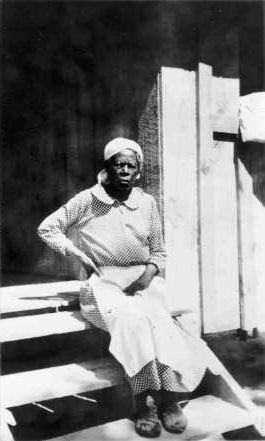

|
Interviewed by Ruby Pickens Tartt
Emma settled herself on the top step at the front of the hall to talk to me,
after first ironing a tiny wrinkle out of her "string apron" with her hand.
"Miss, I'm 'bout sebenty-nine or eighty year old," she told me, "and I belonged to Marse Bill Hawkins end Miss Betty. I lived on deir plantation right over yander. My mammy was called Cassie Hawkins and my pappy was Alfred Jolly. I was Emma Jolly 'fore I married Old Henry Crockett. Us had five chillun and dey's two of 'em livin' in Bummingham, Fannie and Mary.
[end p. 92]
Set down, set down, set down,
Set down, set down,
Set down, chile, set down.
Soul so happy till I kain't set down.
Move de member, move Dan-u-el,
Move de member, move Dan-u-el.
Dan-u-el, member, don' move so slow.
Dan-u-el, member, don' move so slow.
Got on my rockin' shoes, Dan-u-el.
Got on my rockin' shoes, Dan-u-el.
Shoes gwine to rock me home,
Shoes gwine to rock me home, Dan-u-el,
Shoes gwine to rock me home, Dan-u-el,
Shoes gwine to rock me home, Dan-u-el,
Dan-u-el.
Shoes gwine to rock by faith,
Shoes gwine to rock by faith, Dan-u-el,
Shoes gwine to rock by faith, Dan-u-el.
Love de member, move Dan-u-el.
Love de member, move Dan-u-el.
Got on my starry crown, Dan-u-el.
Got on my starry crown, Dan-u-el.
"Dat's all I kin tell you today, honey. Come back when dis misery leave my head and I gwine to think up some tales and old songs.
[end p. 93]
"I lives here wid my grandchile now on Mr. Bob Davis' place. Us gits enough to eat, I reckon, but it's tight, I tell you dat"!
[end p. 94]
Source: The American Slave, Supplement Series 1, Vol. 1: 13-16; see also The American Slave, Vol. 6: 92-94.
| Top of Document | Index of Narratives | Home Page |
Send comments and suggestions to Bruce Fort
Last revised: August 10, 1997